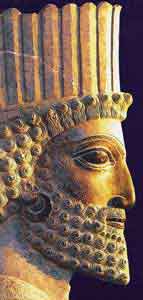| Xerxes
First of four children of Atossa and Darius
Xerxes owed the throne to his “all-powerful” mother, Atossa
He was not the eldest son of Darius
Artabazanes, son of first wife, was the eldest son of Darius
Invasion of Greece:
Xerxes went to war against Greece to avenge the defeat at Marathon
“My intent is to throw a bridge over the Hellespont and march
an army through Europe against Greece, that thereby I may obtain vengeance
from the Athenians for the wrongs committed by them against the Persians
and against my father. . . In his behalf, therefore, and in behalf of
all the Persians, I undertake the war, and pledge myself not to rest
till I have taken and burnt Athens, which has dared, unprovoked, to
injure me and my father.” Herodotus, The Persian Wars
The Bridge over the Hellespont
The first attempt to bridge the Hellespont failed:
“When Xerxes heard of it, he was full of wrath, and straightway
gave orders that the Hellespont should receive 300 lashes, and that
a pair of fetters should be cast into it. Nay, I have even heard it
said that he bade the branders take their irons and therewith brand
the Hellespont. It is certain that he commanded those who scourged the
waters to utter, as they lashed them, these barbarian and wicked words:
‘Thou bitter water, thy lord lays on thee this punishment because
thou hast wronged him without a cause, having suffered no evil at his
hands. Verily King Xerxes will cross thee, whether thou wilt or no.
Well dost thou deserve that no man should honor thee with sacrifice;
for thou art of a truth a treacherous and unsavory river.’ While
the sea was thus punished by his orders, he likewise commanded that
the overseers of the work should lose their heads.” Herodotus,
The Persian Wars
Retreat
After the defeat at Salamis, Xerxes left his land army under the command
of his son-in-law and cousin, Mardonius, and returned to Persia by land
with very few surviving troops.
End of Life
After the failure of his invasion of Greece, Xerxes withdrew to court
life in Persepolis and Susa. In 465 B.C., seven years after the first
performance of The Persians in Athens, Xerxes was assassinated
in his bed in a palace.
|
|

